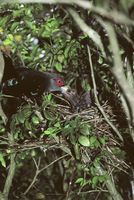|
| Query: Chestnut-bellied cuckoo | Result: 5th of 9 | |
The Chestnut-bellied Malkoha (Phaenicophaeus sumatranus) builds its nest in trees. Made of twigs lodged between the forks of branches, the nest is neatly lined with green leaves (left). In it the female lays two white, glossless eggs.
| Subject: | The Chestnut-bellied Malkoha (Phaenicophaeus sumatranus) builds its nest in trees. Made of twigs lodged between the forks of branches, the nest is neatly lined with green leaves (left). In it the female lays two white, glossless eggs.
| | Source: | http://besgroup.talfrynature.com/category/brood-... |
|

| Resolution: 300x448
File Size: 40877 Bytes
Date: 2007:12:31 15:41:04
Upload Date: 2008:03:26 22:15:09
|
ERROR : Server Busy(-1105)
ERROR : Server Busy(-1105)
The Chestnut-bellied Malkoha (Phaenicophaeus sumatranus) builds its nest in trees. Made of twigs lodged between the forks of branches, the nest is neatly lined with green leaves (left). In it the female lays two white, glossless eggs.
Bird Ecology Study Group » Brood parasitism
The Chestnut-bellied Malkoha (Phaenicophaeus sumatranus) builds its nest in trees. Made of twigs lodged between the forks of branches, the nest is neatly lined with green leaves (left). In it the female lays two white, glossless eggs.
This malkoha is a cuckoo, but unlike most cuckoos from this region, it actually builds its own nest and takes care of its young.
Cuckoos (Family Cuculidae) are notorious for taking advantage of other bird species to look after their young – from nest building to egg incubation to chick rearing. This is what ornithologists call brood or nest parasitism. One common brood parasite many birders are familiar with is the Asian Koel (
|
 |

|

|
Chestnut-bellied cuckoo
5/9 |

|
 |
^o^
Animal Pictures Archive for smart phones
^o^
|
|

